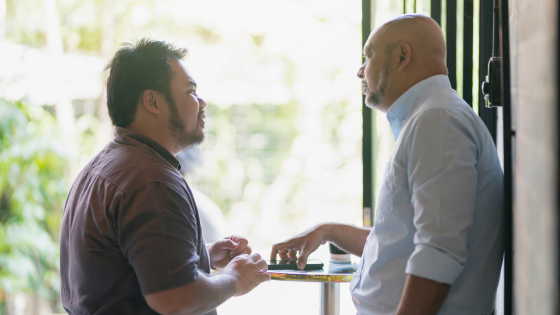I hear my father’s voice very clearly, “One true sign of intelligence is admitting when you don’t know something.” My father didn’t know anything about impostor syndrome but he did understand feeling uncomfortable or insecure. This truth has carried me through many an uncomfortable and challenging situation and I have carried this forward as a communication coach, trainer, and facilitator.
It’s way easier to say and suggest than it is to live. Question is, am I an imposter?
Impostor Syndrome was first described by psychologists Suzanne Imes, PhD, and Pauline Rose Clance, PhD. In the 1970s, they stated that impostor phenomenon occurs among high achievers who are unable to internalize and accept their success. They often attribute their accomplishments to luck rather than to ability, and fear that others will eventually unmask them as a fraud.
With that in mind, can we pause to reflect on what is not impostor syndrome? Let’s question the assumption and acceptance of a current, all-encompassing diagnosis that mostly reflects when we experience insecurity, questioning of oneself, worrying about qualifications for a job. Our questioning of confidence and nervousness are being labeled as impostor syndrome.
Being exposed as not knowing an answer, lacking information we think we’re supposed to know or what direction we’re to go as leaders is often unnerving. Strong leadership models remind us that when we don’t know, we turn to our teams – we turn to our mentors – we research and learn from other sources.
So, that leads to another question, what part does our culture play?
When we look at our cultures, certain individuals aren’t valued based on gender, sexuality, ethnicity, race, or age. We realize that not all individuals are treated as equals. Our cultures are reinforcing a feeling that we are fraudulent because of this valued or devalued approach.
If we feel like an impostor, could it be a result of a cultural phenomenon rather than an individualized one? Could it be that the measuring stick has issues rather than you?
What are we saying? Not all insecurity, nervousness, second-guessing, lack of comfort, etc. is impostor syndrome. Like migraines, migraines are real and not all headaches are migraines. Migraines are a different physiological response in the body, imposter syndrome a different response to stimuli. Both are real and not part of a continuum – migraines are not just more intense headaches. Imposter syndrome is not just more intense self-doubt.
Our culture has now suggested folks claim impostor syndrome when they’re feeling uncomfortable with their competence level. For instance, when we get a promotion, we may be managing a team for the first time. It doesn’t feel comfortable. We may question our abilities – yet, in a few months, with support and leadership training, you begin to build your experience – knowledge – competence and confidence. You were never an impostor– you were someone lacking the ability to separate being uncomfortable from lacking confidence and needed to be aware that your competence would grow as it always has.
It’s important to understand the distinction.
When did it become a catch-all description for any feeling of insecurity? Have we substituted our pattern of people describing that they’re lacking confidence to now labeling ourselves with Impostor Syndrome?
We have seen a shift in leaders or individuals moving away from the statement, “I lost my confidence” to “I have impostor syndrome – or I’ve been told I have impostor syndrome.”
When I went to Yale, people kept saying that I had impostor syndrome because I came from a public school to an Ivy League with a preponderance of prep school folk. Sure, I was uncomfortable; sure, there were super smart people around me, and I felt out of my league – I was out of my league! I hadn’t had the same schooling of so many around me. It didn’t make me an impostor. So, I played heavy duty catch up. Lack of exposure and experience can lead to insecurity that causes a person to question. I didn’t look around and embraced the truth that I didn’t have as much prior experience nor knowledge. I did, however, believe that I had the ability. I didn’t have Impostor Syndrome. I had the self-awareness to know that I was different from others and less prepared for specific academics. There was work to be done so that I could find my place.
Insecurity is a part of our growth and developmental journey
For individuals, our insecurities are key to traveling through this world and builds true self-awareness. We need a healthy perspective of ourselves and if we’re constantly being told that any doubt or questioning is impostor syndrome– ultimately, where will this lead?
Let’s ask and embrace the usual questions: am I out of my league? And if so, what can I do to shore up my skills? Just because we’re insecure doesn’t mean we have impostor syndrome, nor that we lack confidence. Sometimes we really do need to work on our skills, build our experience and allow time to prove our excellence.
Impostor syndrome is connected to our culture
As communication coaches, we’re hearing far too many individuals label everything as impostor syndrome – and it’s largely happening with women.
We’ve created a culture where everyone gets a trophy. Have we created this epidemic – wait, everyone got a trophy, I got a trophy and yet someone really did win, right? Maybe my trophy is a fraud?
Let’s leave impostor syndrome to the individuals that are truly experiencing it. It’s real. And if we diagnose everything as impostor syndrome, we devalue those who are really suffering from it.
Empowerment and hope.
Being self-aware, curious, and intentional with our communication and interactions is essential. If we’re self-aware, without the tools to adjust, we can become self-conscious and close off.
We can be uncomfortable. We can be nervous. We can question our abilities. We can second guess ourselves. We can feel insecure. We can feel that others may not be seeing our value. We can have fears about our role. We can question if we were the right person for the job. We can pause to consider if we’re an expert in an area of information. None of these, by definition, need to be predictive of impostor syndrome.
Let’s embrace our amazingness and innate individual brilliance and give time for growth in experience and professional development. Good to keep in mind, “One true sign of intelligence is admitting when you don’t know something.” And keep on learning.
Hilary Blair is a leadership keynote speaker based out of Denver, CO, and is the co-founder of ARTiculate: Real & Clear. She is also a highly regarded, actor, improviser, facilitator, voice-over artist, and voice expert coach. Contact us today to learn more.


